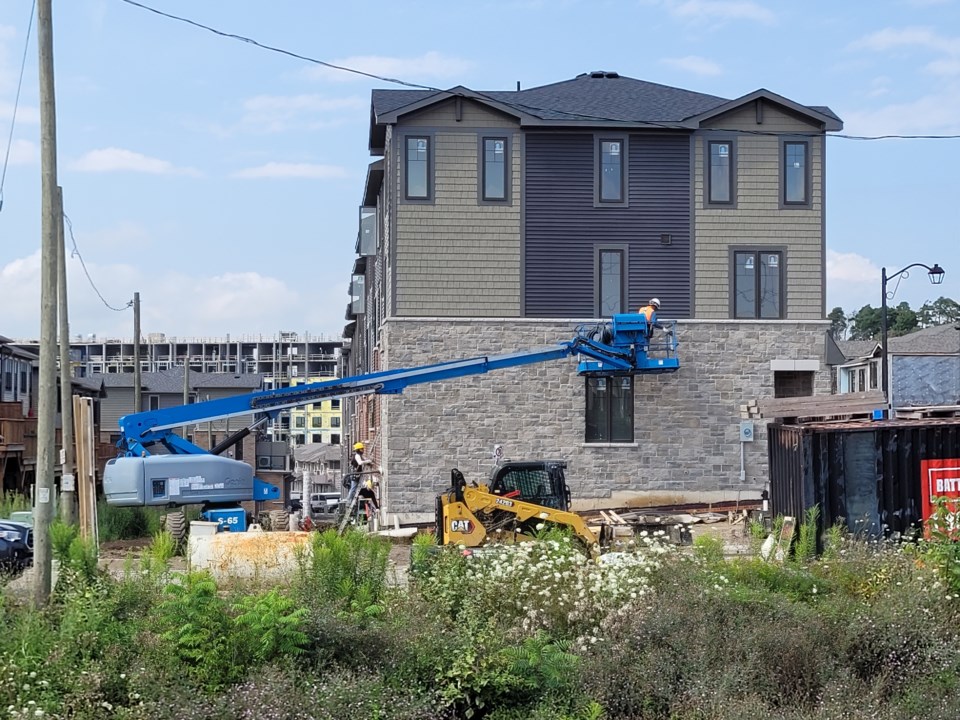New housing construction stats released by the Canadian Housing and Mortgage Corporation last week reveal the city is lagging far behind its annual 2,100-unit housing target and may not be able to access new funding announced by the province yesterday.
Premier Doug Ford said the province will give municipalities that meet at least 80 per cent of their yearly housing targets a portion of a new three-year $1.2 billion Building Faster Fund, with bonuses if they exceed 100 per cent.
Ford, who was at the Association of Municipalities of Ontario when he made the announcement, said housing starts that are outpacing numbers from the last two years in some parts of the province are proof of “positive momentum.”
That's not the picture in Cambridge where only 605 new units have been built or started to date in 2023.
Although the number is up over last year's 539, it's far from the city's target.
The city would have to more than double that pace over the next five months to access to the $400-million available to 50 municipalities each year for the next three years.
Cambridge is tasked with getting 19,000 new homes built by 2031, equal to 1.2 per cent of the province's 1.5 million housing target.
That means if it hits 100 per cent of its target this year, it would get $4.8 million from the Building Faster Fund.
The money is being used by the province as an incentive to replace a portion of what municipalities lost when development charges were removed or discounted as part of Bill 23.
With plans for close to 12,000 new homes in various stages of approval at the City of Cambridge, the city's housing goal appears within reach.
But most of the work to build those homes has been paused for various reasons.
Even with $4.8 million on the line this year, Cambridge's deputy city manager of community development Hardy Bromberg says all the city can continue to do is grant approvals and work with developers to create site plans and secure building permits.
It doesn’t build housing and has no control over decisions by private sector developers to stall projects, some of which were approved by council three years ago, Bromberg says.
Once planning approval is granted, there is no guarantee the project will go ahead.
The city's hands are also tied when it comes to factors affecting the industry, which over the last few years has included everything from inflation and interest rates to supply chain issues and labour shortages.
A report released last week by the Canadian Home Builders' Association said fewer sales due to high interest rates means fewer units will be built, with nearly one quarter of home builders saying the slowdown is causing them to cancel projects entirely.
Those issues don't seem to have been a factor in Brantford, which is on track to smash provincial targets by building 176 per cent of its target. Pickering is also on track to build 150 per cent of its target.
As to what's causing projects to stall in Cambridge, Bromberg isn't speculating.
The housing sector is cyclical and meeting targets on a monthly or even annual basis likely won't happen, he says. And it would be a daunting task to follow up with every developer to find out where their plans stand.
Recent discussions related to the Cambridge LRT extension’s $4.5 billion price tag are rumoured to be adding to builder hesitancy.
Options the region is proposing for the Stage 2 business case around shorter routes and a move to bring the terminus to Dundas and Main instead of downtown Galt have also been part of speculation around builder apprehension, particularly along Hespeler Road.
But Bromberg doesn't necessarily see that as a factor.
Some projects in the city’s south end, which don’t hinge on the LRT route, have been paused as well, says Bromberg, who remains confident the 12,000 new homes that are approved or nearing approval in Cambridge will get built eventually.
It just might not happen as soon as the province would like.
“We’ll be judged by 2031,” he says.
